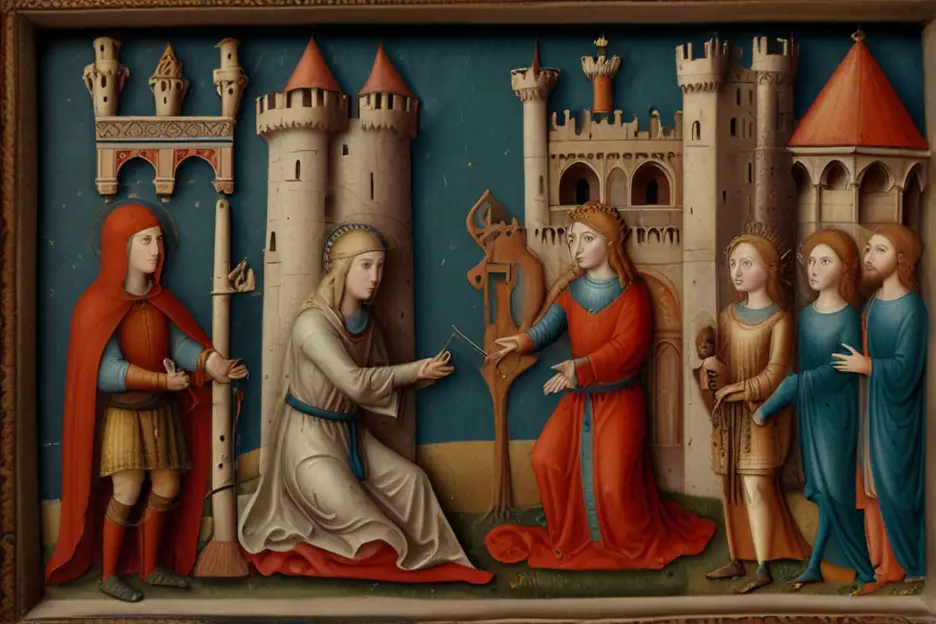
The Middle Ages, also known as the Medieval Period, spanned from the 5th to the 15th century and was marked by significant political, military, religious, and cultural events.
This era saw the rise and fall of empires, the spread of new religions, and the development of new technologies and institutions.
In this article, we will explore some of the major events that shaped the Middle Ages, including political and military events, religious and cultural developments, and their impact on society.
Political and Military Events

The Fall of the Roman Empire (476 AD)
The fall of the Western Roman Empire marked a pivotal moment in history, symbolizing the end of classical antiquity and the onset of the Middle Ages.
The empire’s collapse was a culmination of various factors, including external pressures such as invasions by Germanic tribes, internal strife, and economic decline.
The once-mighty Roman Empire, which had dominated much of Europe for centuries, fragmented into smaller kingdoms and paved the way for the rise of new powers in the region.
Rise of Charlemagne and the Carolingian Empire (8th-9th centuries AD)
Charlemagne, a charismatic Frankish king, emerged as a central figure in European history during the early Middle Ages.
Through military conquests and strategic alliances, Charlemagne expanded his realm, known as the Carolingian Empire, across much of Western Europe.
His reign witnessed a revival of learning and culture, often referred to as the Carolingian Renaissance. Charlemagne’s legacy as a ruler and patron of the arts left an indelible mark on European civilization.
The Viking Invasions (8th-11th centuries AD)
The Viking invasions, originating from the Scandinavian regions, were characterized by raids, plundering, and eventual settlement in various parts of Europe.
Norse seafarers, known as Vikings, targeted coastal areas and riverways, disrupting trade and exerting influence over local populations.
Despite their reputation as fierce warriors, Vikings also played a role in exploration and trade, establishing trade networks that stretched from the Baltic Sea to the Mediterranean.
The Crusades (1095-1291 AD)
The Crusades were a series of religious and military expeditions launched by Western European Christians to reclaim Jerusalem and other holy sites in the Holy Land from Muslim control.
Spanning several centuries, the Crusades had profound cultural, religious, and political repercussions. While they led to the establishment of Christian states in the Levant, they also fostered religious intolerance and contributed to the polarization of East-West relations.
The Hundred Years’ War (1337-1453 AD)
The Hundred Years’ War was a protracted conflict between the Kingdom of England and the Kingdom of France over territorial disputes and dynastic claims.
Lasting over a century, this conflict saw major battles such as the Battle of Crécy and the Siege of Orléans.
The war reshaped the political landscape of Europe, weakening feudal structures and contributing to the centralization of power in both England and France.
The Black Death (1346-1353 AD)
The Black Death, one of the deadliest pandemics in human history, ravaged Europe during the mid-14th century.
Believed to have originated in Central Asia, the bubonic plague spread rapidly through trade routes, decimating populations and causing widespread social and economic upheaval.
The pandemic had profound effects on medieval society, leading to labor shortages, religious fervor, and changes in cultural attitudes towards death and suffering.
Religious and Cultural Events

The Rise of Christianity
Christianity, originating from the teachings of Jesus Christ in the first century AD, gradually gained prominence in Europe during the Middle Ages.
Its rise marked a profound shift in religious and cultural dynamics, as it supplanted older pagan beliefs and practices.
Christianity’s influence extended beyond matters of faith, permeating various aspects of society, including art, literature, and law.
Christian values and teachings provided a framework for moral and ethical behavior, shaping European civilization for centuries to come.
The Great Schism (1054 AD)
The Great Schism, also known as the East-West Schism, divided the Christian Church into the Roman Catholic Church in the West and the Eastern Orthodox Church in the East.
The split stemmed from theological differences, as well as disputes over ecclesiastical authority and cultural differences between the Latin-speaking West and the Greek-speaking East.
The Great Schism had far-reaching consequences, deepening the divide between Eastern and Western Christianity and shaping the religious landscape of Europe and the Mediterranean region.
The Spread of Islam
Islam, founded by the Prophet Muhammad in the 7th century AD, spread rapidly across the Middle East and North Africa following his migration from Mecca to Medina in 622 AD (known as the Hijra).
The expansion of Islam brought profound cultural, political, and economic changes to the regions it reached.
Islamic civilization flourished, fostering advancements in science, philosophy, and the arts, while also influencing the development of trade networks and architectural styles.
The Development of Feudalism
Feudalism emerged as a social and political system in medieval Europe, characterized by the exchange of land (fiefs) for military service and loyalty.
At its core, feudalism was a hierarchical arrangement where lords granted land to vassals in exchange for military support and other services.
This system provided stability and security in a fragmented and decentralized society, laying the groundwork for medieval governance and shaping the relationships between rulers and subjects.
The Rise of Universities
The Middle Ages witnessed the establishment of the first universities in Europe, marking a significant milestone in the history of education and scholarship.
These institutions, such as the University of Bologna and the University of Paris, emerged as centers of learning, attracting students and scholars from across the continent.
Universities played a vital role in preserving and transmitting knowledge, fostering intellectual inquiry, and laying the groundwork for the Renaissance and the Enlightenment..

Conclusion
The Middle Ages stand as a transformative era in European history, characterized by a multitude of events spanning politics, military endeavors, religion, and culture.
These events not only altered the course of medieval Europe but also laid the groundwork for many aspects of the world we inhabit today.
Exploring these events and comprehending their repercussions is crucial for gaining insight into contemporary society.
They represent pivotal moments that shaped the trajectory of European civilization and continue to influence our modern world.


